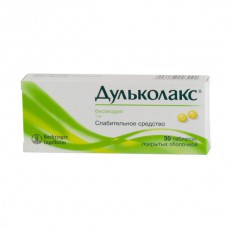Expiration dates: 11/2021
Structure and Composition:
Film-coated tablets. One tablet contains bisacodyl 5 mg
Excipients: lactose, corn starch, magnesium stearate, sucrose, glycerol acacia talc titanium dioxide Eudragit L and S dibutyl glycol 6000 iron oxide yellow beeswax carnauba wax shellac unbleached
Patients in plastic for 30 pieces. In the paper cartons 1 bottle, or PVC / aluminum or PVC / PVDC blister packs of 10 pieces. In the paper cartons 3 blisters.
Suppositories for rectal administration. One suppositorie contains 10 mg bisacodyl
Other ingredients: Witepsol W45
card of 6 pieces. in a cardboard box 1 blister.
Description pharmaceutical form:
Tablets: Round, biconvex, beige-yellow film-coated tablets, with a flat, smooth, shiny surface and white kernel.
Rectal suppositories: slightly yellowish white or torpedo-shaped suppositories, with a smooth or slightly oily surface and narrowing of the base.
Description of the pharmacological actions:
It is a prodrug, when administered in an alkaline medium is hydrolyzed to form a substance is irritating to the mucous membrane of the gastrointestinal tract (increased secretion of mucus in the large intestine, accelerates and amplifies its peristalsis). If ingestion acts in 6-10 hours at the reception before going to bed - in 8-12 hours.
For rectal application increases secretion of mucus in the large intestine, it accelerates and enhances motility. Action due to direct stimulation of nerve endings in the colon mucosa.
Indications:
Common for both formulations:
- constipation, hypotension caused by the colon (in the elderly, in bedridden patients after surgery, childbirth)
- preoperative preparation and preparation for instrumental and radiological investigations.
- For additional tablets - regulation stool with hemorrhoids, proctitis, anal fissures.
Contraindications:
Common for both formulations:
- hypersensitivity
- ileus
- strangulated hernia
- acute inflammatory diseases of the abdominal cavity, including peritonitis
- bleeding from the gastrointestinal tract
- uterine bleeding
- spastic constipation
- acute proctitis
- acute hemorrhoids.
Pills:
- cystitis
- Children up to age 6 years.
suppositories:
- acute inflammatory bowel disease
- severe dehydration
- colon carcinoma.
With care (for both dosage forms):
- pregnancy
- lactation
- kidney disease
- liver disease
- suspicion of inflammatory bowel disease.
Application of pregnancy and breastfeeding:
During pregnancy and breastfeeding should be careful to apply only on prescription.
Side effect:
Common for both dosage forms: from the gastrointestinal tract - abdominal cramping, diarrhea, which can lead to dehydration and disruption of water and electrolyte balance (muscle weakness, convulsions, decreased blood pressure).
The tablets additionally: allergic reactions from the gastrointestinal tract - flatulence.
Suppositories further: the use of high doses or prolonged use of bisacodyl may lead to the development of intestinal atony.
Drug Interactions:
The combined use of the drug in the form Dulkolaks antacid tablet, as well as milk and alkaline mineral water can lead to premature dissolution of the tablets and membranes irritation of stomach and duodenum.
Dosage and administration:
Pills
Inside, swallowing whole, squeezed small amounts of liquid.
For constipation, hypotension caused by colon, for controlling the chair with haemorrhoids, proctitis, anal fissures:
- Adults and children over 12 years - on the table 1-2. appointment
- Children 6-12 years of age - 1 table. to accept 1 time a day at bedtime or in the morning for 30 minutes before eating
In preparation for surgery, instrumental and radiological investigations - Table 2. at night the day before the study, and Table 2. the night before the operation or investigation.
Suppositories
Rectal suppository inserted into the rectum pointed end first, adults and children over 10 years - 1 supp. 1-2 times a day for children 6-10 years - 1/2 supp. 1-2 times per day for up to 7 days (unless directed by a physician).
In children younger than 6 years of use is possible only on prescription.
Overdose:
Pills
Symptoms may be diarrhea, dehydration, cramps in the abdomen, disturbance of water and electrolyte balance, hypokalemia, development atony of the colon.
Treatment: symptomatic.
Special instructions:
You should avoid long-term use of the drug. The tablets should not be taken simultaneously with antacids alkaline mineral water or milk.



